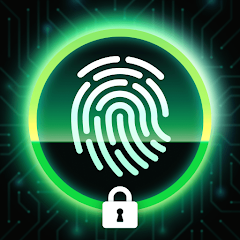In today’s tech-driven world, security is paramount. Whether protecting sensitive data or securing personal devices, modern innovations like fingerprint locks have revolutionized the way we approach security. This article delves deep into the world of fingerprint locks, exploring their features, advantages, and more.
What is Fingerprint Lock?
A fingerprint lock is a biometric security mechanism that uses an individual’s unique fingerprint patterns to grant access. Unlike traditional locks that rely on keys or PINs, fingerprint locks offer enhanced security and convenience by ensuring only authorized users can gain entry.

Key Components of Fingerprint Locks
- Scanner: Captures the fingerprint for authentication.
- Processor: Analyzes the fingerprint pattern.
- Memory: Stores authorized fingerprint data.
- Lock Mechanism: Engages or disengages based on authentication.
How Fingerprint Lock Works
Fingerprint locks work by comparing a scanned fingerprint against stored fingerprint data. Here’s the step-by-step process:
- Enrollment: Users register their fingerprint by scanning it multiple times to create a detailed template.
- Storage: The fingerprint data is encrypted and stored within the device.
- Authentication: When a user places their finger on the scanner, the system compares the fingerprint to the stored data.
- Access Granted/Denied: If the scanned fingerprint matches the stored data, the lock opens. Otherwise, access is denied.
Features of Fingerprint Lock [Completely Detailing]
Fingerprint locks come packed with a variety of features designed for security and user convenience:
- High Security: Offers robust protection against unauthorized access.
- Ease of Use: Eliminates the need to remember PINs or carry keys.
- Multi-user Support: Allows multiple fingerprints to be registered, ideal for families or offices.
- Durability: Made with tamper-proof materials to resist physical breaches.
- Integration with Smart Devices: Many models can connect to smartphones or home automation systems.
- Quick Response Time: Unlocks in a fraction of a second for instant access.
- Battery Backup: Ensures functionality during power outages.
- Weather Resistance: Suitable for both indoor and outdoor use.
Pros of Fingerprint Lock [Use Table]
| Pros | Details |
|---|---|
| Enhanced Security | Fingerprint patterns are unique and difficult to replicate. |
| Convenience | No need for keys or passwords. |
| Quick Access | Unlocks instantly with a single touch. |
| Multi-user Capability | Supports multiple users for shared access. |
| Durable Build | Designed to withstand tampering and environmental challenges. |
| Smart Integration | Compatible with home automation and smartphone apps. |
Cons of Fingerprint Lock [Use Table]
| Cons | Details |
| Cost | More expensive compared to traditional locks. |
| Power Dependency | May require regular battery changes or electrical power. |
| False Rejections | Dirty or damaged fingers can cause access issues. |
| Privacy Concerns | Potential misuse of stored biometric data. |
| Environmental Limitations | Extreme weather conditions can impact performance. |
Fingerprint Lock Alternatives [Use Table]
| Alternative | Description |
| PIN/Password Locks | Use numerical or alphanumeric codes for access. |
| Keypad Locks | Require physical keys for operation. |
| Face Recognition Locks | Utilize facial biometric data for authentication. |
| Card-Based Locks | Access granted through RFID or magnetic swipe cards. |
| Voice Recognition Locks | Authenticate users through voice patterns. |
Conclusion and Verdict Fingerprint Lock
Fingerprint locks represent a significant leap forward in security technology, blending convenience with cutting-edge innovation. While they come with certain drawbacks like cost and privacy concerns, their benefits far outweigh these challenges. Whether for personal or professional use, a fingerprint lock can enhance security and streamline access control.
Investing in a fingerprint lock is a step toward embracing the future of security. With multiple options available, users can select a model that fits their specific needs and budgets.
Fingerprint Lock FAQs
Q: Are fingerprint locks safe?
A: Yes, they offer high security and are difficult to bypass compared to traditional locks.
Q: Can fingerprint locks be hacked?
A: While no system is completely immune, fingerprint locks employ encryption and advanced algorithms to minimize risks.
Q: What happens if the fingerprint scanner malfunctions?
A: Most models include backup access methods like PINs or mechanical keys.
Q: Do fingerprint locks work in extreme weather?
A: Many models are weather-resistant, but performance can vary in extreme conditions.
Q: How long do fingerprint locks last?
A: With proper maintenance, they can last several years, depending on the model and usage conditions.
Download Link



